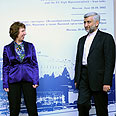
Iran and world powers on Monday locked horns in hours of tense talks in Moscow seeking a diplomatic solution to the crisis over Tehran's nuclear program with no breakthrough in sight.
At talks billed as a last chance to find hope of a negotiated solution to the decade-long standoff, the West was looking for signs that Iran could show willingness to scale down the intensity of its uranium enrichment activities.
Related stories:
- Senators urge Obama to set conditions in Iran talks
'Secret war on Iran's nuclear program not working'
World powers start nuclear talks with Iran
But a member of the Iranian delegation gave a downbeat assessment well into the second session in the afternoon. "So far the atmosphere is not positive," he said, adding: "Setting up the framework (for negotiation) is the main problem."
Chief Iranian nuclear negotiator Saeed Jalili was meeting with envoys from six world powers including Tehran's arch-foe the United States as well as EU foreign policy chief Catherine Ashton for two days of talks.
But the Iranian diplomat said that based on the morning's talks "it is possible" that the second day would not even be required, without elaborating.
Jalili had gone into the talks in uncompromising mood, telling Iranian state television: "These negotiations are a big test to see if the West is in favour of Iran's progress or against."
The EU delegation spokesman told reporters that world powers were sticking by a previous demand for Iran to halt enriching uranium to 20% – a level approaching that needed to make an atomic bomb.
Heavy repercussions
Failure of the talks could have heavy repercussions, with the United States and its ally Israel refusing to rule out the option of airstrikes against the Iranian nuclear program and Tehran facing sanctions that could cripple the economy.
But Iran made clear ahead of the negotiations that it has no intention of abandoning its right to enrich uranium, a process that can be used to make nuclear fuel but also the explosive core of an atomic bomb.
"If this demand isn't recognised, the negotiations are certainly headed for failure," an unidentified Iranian official at the talks said, according to state news agency IRNA.
Without referring specifically to the talks, Iran's Supreme Leader Ayatollah Ali Khamenei said: "The enemy must know that arrogance and misplaced expectations will lead nowhere against a people who have learned the resistance of the Koran."
Russia's Kommersant daily said Iran would be offered a compromise plan under which it would scale down the degree to which uranium is enriched at its main enrichment facility in Natanz, from 20% to 3.5 or 5%.
The West accuses Iran of seeking an atomic bomb under the guise of a civilian nuclear energy program, a charge vehemently denied by Tehran. Host Russia has long taken a more cautious line, saying that Iran must restore confidence but not explicitly accusing it of military intentions.
The urgency for Iran is compounded by a July 1 European Union deadline for Tehran to avert a full oil embargo and the June 28 rollout of tough US sanctions against a host of countries that buy Iranian oil.
"This meeting is going to be decisive. (If the talks fail) a toughening of sanctions against Tehran will be unavoidable and the use of military force very real," Kommersant said.
In a hint of compromise, President Mahmoud Ahmadinejad said Iran is ready to suspend its controversial enrichment of uranium to 20% if Europe guarantees delivery of nuclear fuel for its reactors, according to his website.
The world powers are the so-called "P5+1" – Britain, China, France, Russia and the United States, plus Germany. Jalili also held a bilateral meeting with the EU's Ashton and was due to hold another with Russian envoys later.
The talks follow a bruising session in Baghdad in May that failed to make any noticeable progress beyond agreeing a date for more talks, an outcome that may not be acceptable to the West if repeated in Moscow.
"If Iran remains unwilling to take the opportunities these talks present, it will face continuing and intensified pressure and isolation," a Western diplomat said.
- Receive Ynetnews updates
directly to your desktop















